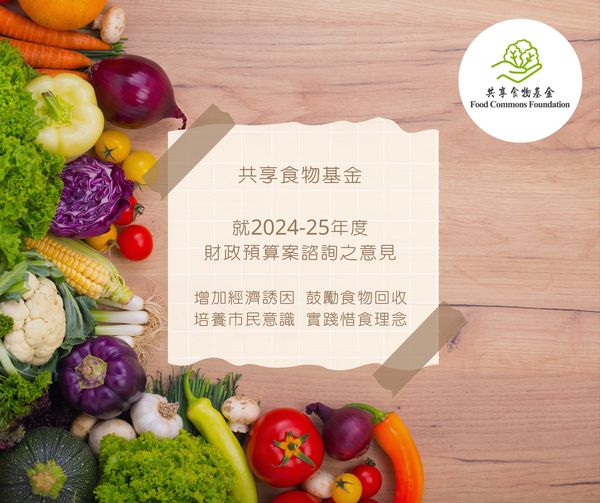

![]() 2024-01-19
2024-01-19
Food Commons Foundation's Views on the 2024-25 Budget Consultation
Increase economic incentives to encourage food recycling
Cultivate citizen awareness and practice the concept of food wise
The government will implement municipal solid waste (MSW) charging in April this year. This move is believed to reduce the load on landfills and can also cultivate the habit of collecting and processing general household waste and food waste separately among the public. It also helps deepen the impression of separate recycling. However, many members of the public say they do not understand the garbage levy's details. It is recommended to allocate more resources, use economic incentives to encourage food recycling, reduce waste at source and strengthen publicity and education about garbage levy. Then citizens can better understand its original intention and operational details and put the concept of food wise into practice. The following are relevant comments:

Increase economic incentives to encourage food recycling
· Provide tax deductions for charitable donations of food and encourage industrial and commercial companies engaged in wholesale, retail, food processing and catering industries to promptly donate food that is about to expire but is still edible to charitable organizations to avoid creating food waste.
· Extend "Pilot Scheme on Food Waste Smart Recycling Bins in Private Housing Estates" to support single-storey houses and small housing estates with less than 1,000 households for household food waste recycling, including providing supporting equipments and subsidizing operating costs, so that property management companies and owners' corporations can have greater incentives to install more food waste recycling facilities and actively promote food waste recycling to residents.
Cultivate citizen awareness and practice the concept of food wise
· Actively promote primary and secondary schools to carry out food recycling activities in schools and allocate funds to the Education Bureau to train teachers to educate students on relevant knowledge. So, students can get used to recycling from the practice of campus life, know how to cherish food and take the concept home to influence their families.
· Allocate resources in comprehensive public education to promote the concepts of "wet and dry separation" and "food sharing". All food and other types of recyclables must be processed separately to avoid contamination of other recyclables; if the food has not expired, it should be donated to non-profit organization for charitable purposes.
· Increase funding from the Environment and Conservation Fund for the Food Recovery Education Subsidy Scheme, allowing non-profit organizations to apply for funding to carry out food wise education to people of different ages and ethnicities in the community, so citizens can consciously reduce food waste at the source and make good use of community recycling facilities.
Food Commons Foundation is a charitable organization dedicated to rescuing leftover food. Its Food Commons Hong Kong is the first community network in Hong Kong to systematically recycle leftover food in markets across different districts. This program has already successfully rescued 10,836 tonnes of leftover food that were supposed to be sent to landfills and benefited more than 9.37 million people. This project has great social value. Not only does it reduce food waste, but also helps those in need.
Given that the economy has not returned to normal after the epidemic and the impact of factors such as overseas consumption, Hong Kong will still face economic challenges in the future. Therefore, we suggest that when the government prepares next year's budget, they should increase its support for food-wise related measures. Especially when it comes to leftover food processing, the government can implement tax incentives for donating food to encourage people to donate leftover food; set up advanced food waste recycling facilities in various communities and housing estates to reduce food waste; increase resources to promote food wise education and raise public awareness about reducing food waste. These measures will not only create a greener economic environment, but can also reduce pressure on citizens and businesses.
At this critical moment, we hope that the government can actively promote food-wise related measures and promote the sustainable development of society. We hope the government will consider our suggestions.
Food Commons Foundation
19 January 2024






